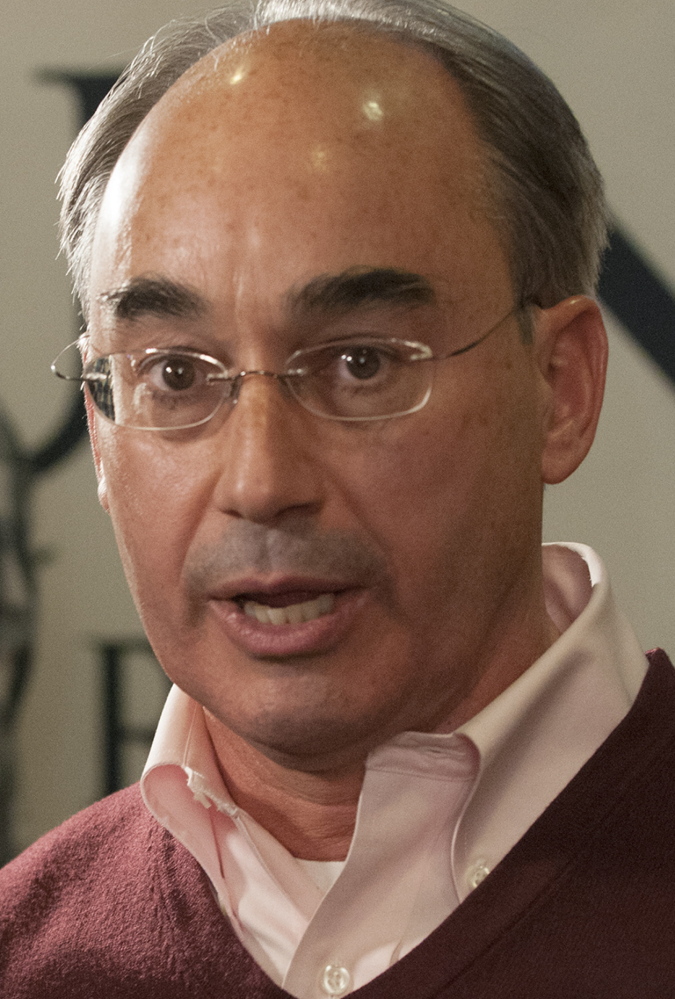Representatives from U.S. Rep. Bruce Poliquin’s office and the National Republican Congressional Committee said Tuesday that there was no improper coordination between the first-term congressman and the committee, after reports surfaced of a confidential agreement between the two.
Poliquin, R-District 2, is one of roughly two dozen House Republicans participating in NRCC’s Patriot Program that helps incumbent House members win re-election. As part of the program, the representatives reportedly agreed to share their legislative strategies with the House Republicans’ campaign arm and to meet specific goals. But the agreement raised red flags among some observers – including a former legal counsel for the Federal Election Commission – about whether the campaigns were crossing the line in terms of coordination.
“They’re requiring the campaign to meet certain standards and to provide so much information about how the campaign is going to operate, the issues it’s going to deal with, what its proposals are going to be,” Larry Noble, chief legal counsel for the Campaign Legal Center in Washington, D.C. and a former legal counsel for the Federal Election Commission, told the Press Herald last week. “To me, that really undermines the NRCC’s ability to do any independent expenditures.”
Federal Election Commission rules allow political candidates to coordinate with outside political groups, such as the NRCC. But if they do coordinate, the outside groups cannot spend unlimited amounts of money known as “independent expenditures” on behalf of the candidate. Some large political organizations both advise political candidates and make independent expenditures, but those functions must be run separately.
Poliquin was not available for an interview Tuesday because he was attending to a hospitalized family member, according to Brent Littlefield, the congressman’s political adviser. Littlefield dismissed the suggestions that Poliquin may be giving up some autonomy to the NRCC.
“This is the continuation of an apparently coordinated effort of the Democratic Party and their allies to try to turn nothing into something,” Littlefield said. “Congressman Poliquin has consistently shown his independence of any outside influence.”
Chris Pack, spokesman for the NRCC, said that Noble was “factually and legally wrong” and that “there is nothing about the Patriot Program that raises coordination issues, period.”
“The NRCC is in full compliance with FEC laws and is firewalled off from other independent groups, including the NRCC independent expenditures,” Pack said.
Among the 13 requirements in the Patriot Program agreement – first reported by The Washington Post – is the submission of a campaign plan to the NRCC that includes “detailed, written legislative strategy that provides short-, intermediate-, and long-term legislative goals, including political justifications for those goals.” The agreement also sets fundraising goals for candidates and suggests that campaigns will have to use NRCC-sanctioned vendors for services such as polling, mail communications, fundraising and research.
The NRCC spent nearly $1.3 million on Poliquin’s behalf in 2014, when he defeated former Democratic state Sen. Emily Cain of Orono and independent Blaine Richardson. Cain and Joe Baldacci of Bangor have declared their candidacy for the Democratic nomination to challenge Poliquin in 2016.
Send questions/comments to the editors.




Success. Please wait for the page to reload. If the page does not reload within 5 seconds, please refresh the page.
Enter your email and password to access comments.
Hi, to comment on stories you must . This profile is in addition to your subscription and website login.
Already have a commenting profile? .
Invalid username/password.
Please check your email to confirm and complete your registration.
Only subscribers are eligible to post comments. Please subscribe or login first for digital access. Here’s why.
Use the form below to reset your password. When you've submitted your account email, we will send an email with a reset code.